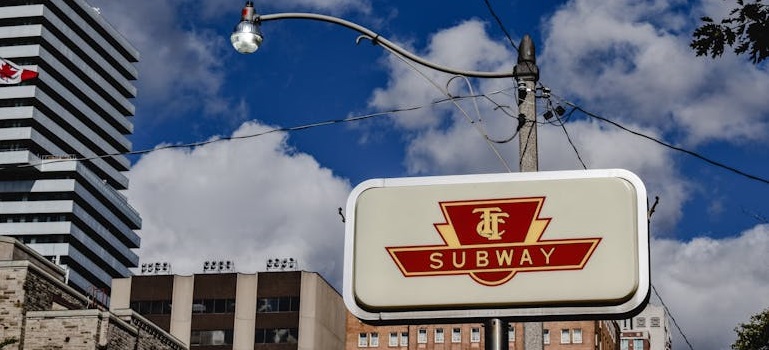Get Your Free Estimate Now
"*" indicates required fields
Toronto is a large city, but people still expect polite and respectful behavior. If you’re relocating here, it’s important to understand certain social habits. These aren’t written rules, but they matter just as much. They help people get along and avoid conflict in shared spaces. In a city this size, courtesy keeps things running smoothly. Even small gestures can shape how locals respond to you. Following these polite habits helps you fit in and feel more welcome. Locals notice when newcomers respect the way things are done. We are here to share the 5 unwritten rules of politeness in Toronto to help you adjust faster. These rules apply in public places, stores, transit, and even elevators. You’ll interact with people daily, so it helps to understand what’s expected. For extra support during your move, consider hiring Professional Movers Canada to handle your relocation with care and respect.
Respect personal space on transit and sidewalks
In Toronto, giving others space is one of the most important social habits. On buses and trains, people avoid sitting too close if other seats are open. Loud talking, speakerphone use, and staring are not welcome. People usually keep to themselves during their commute. It’s normal not to make small talk on public transit. Many locals wear headphones and avoid eye contact. This is not rude—it’s respectful. It means they want quiet or personal time.

On sidewalks, walk on the right side and allow space for others to pass. Avoid stopping in the middle of a busy path. Move to the side if you need to check your phone. Keep your walking pace steady, especially in crowded areas. This helps keep things flowing and respectful for everyone. If you follow these habits, you’ll blend in quickly. Newcomers arriving with help from local movers in Toronto often notice this personal space rule right away.
Always hold the door if someone is close behind
One polite habit that stands out in Toronto is door-holding. It’s a common, everyday gesture. If someone is just a few steps behind you, hold the door for them. It doesn’t matter who they are—everyone does it. This small act helps show that you’re aware of others. If someone holds the door for you, say “thank you.” People here notice when you don’t. You’ll often see people waiting a second to help someone enter behind them. It’s normal at stores, offices, condo buildings, or restaurants.
This quick habit shows respect for those around you. It’s not seen as old-fashioned. Instead, it reflects common courtesy in daily life. You don’t need to make a big deal of it. A quick look, smile, or nod is enough. If someone doesn’t say thanks, just let it go. Among the best moving companies in Toronto ON, those who live and work in the city know how important these social customs are.
Say sorry, even when it’s not your fault
In Toronto, saying “sorry” is very common. It doesn’t always mean you did something wrong. Often, it simply softens a moment or eases a situation. For example, if someone bumps into you, you might still say “sorry.” This is a way of keeping peace and avoiding tension. It helps show you’re aware of others and respect their space. Locals use “sorry” like a neutral word—it’s a buffer in small interactions. People say it when passing by someone, reaching across a counter, or asking for help. You don’t need to overuse it, but not saying it at all can seem unfriendly.
Using “sorry” also helps in unclear situations. It makes communication smoother and kinder. You’ll hear it several times a day. You’ll probably start using it yourself. If you’re hiring a packing service in Toronto, polite exchanges with your team make the process much easier.
Avoid loud or aggressive conversations in public
In Toronto, people value calm and respectful behavior in public settings. Most avoid loud conversations, especially around strangers. Speaking quietly helps everyone share public space peacefully. Yelling or swearing draws unwanted attention and makes others uncomfortable. People expect a certain level of self-control in public. You’ll often see groups keeping their voices low, even when talking excitedly. If you’re on the phone, step aside and lower your voice. Avoid raising your voice, even if you’re frustrated. In tense moments, people often walk away instead of reacting strongly. This approach helps prevent awkward or stressful encounters. Staying calm shows respect and awareness of your surroundings.
- Step outside if your call becomes long or emotional
- Lower your voice when entering elevators or waiting rooms
- Avoid venting loudly in public places or on transit
- Don’t interrupt others or dominate group conversations
- Keep strong opinions private in small, enclosed spaces
- Watch your volume near children or older adults
- Avoid pacing or dramatic gestures while speaking in public

Even in social settings, you should pay attention to tone and timing. Speak kindly, but also keep your voice low. Try to read body language if someone looks bothered or uncomfortable. When you show patience, others around you feel at ease. Many locals avoid public arguments, even when they feel upset. A calm tone often keeps situations from escalating. In parks, patios, and coffee shops, people expect a peaceful environment. If someone nearby speaks quietly, match their volume. When you speak gently, you leave a better impression. This small adjustment helps you communicate clearly without causing stress or discomfort.
Don’t cut in line or ignore queue etiquette
Waiting your turn is taken seriously in the city of Toronto. People here respect lines—at stores, cafes, bus stops, and events. If you walk up to a counter, always look to see if someone is already waiting. If you’re not sure, ask politely. Never step ahead without checking. Cutting in line will likely annoy others and draw quiet disapproval. Locals won’t always say something, but they’ll notice. Even in casual settings, such as food trucks or street vendors, queuing is expected.

Give people space while waiting, but stay alert so the line moves smoothly. Don’t push, crowd, or stand too close. If you need to leave the line, let someone behind you know. Simple gestures like this show that you’re aware and polite.
Adjust to the unwritten rules of politeness in Toronto in your new life
Understanding local habits makes it easier to live in a new city. Toronto’s culture values quiet respect, space, and awareness. You don’t need to change everything about yourself. But adopting these five small habits helps you adjust faster. Locals will notice your effort and respond positively. You feel more connected when you respect space, speak calmly, and follow social cues. These five unwritten rules of politeness in Toronto help reduce tension and build trust in daily life. They also make asking for help, joining conversations, or making friends easier. Even simple gestures, like holding a door or saying “sorry,” show that you care. Politeness isn’t about perfection—it’s about making life easier for everyone. If you’re new to Toronto, practicing these rules is a smart first step. You’ll feel more at home—and others will feel more comfortable around you.
Contact Us
Get access to a variety of moving and storage Canada solutions:

Contact Our team
Call Professional Movers Canada or fill out our free moving quote form.

Get Your Quote & Plan
Receive an obligation-free estimate and a detailed plan of action for your move.

Enjoy a Professional Move
Leave all the vexing tasks of relocation to our skilled Canada movers.